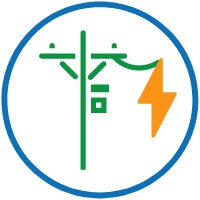The Clean Energy Jobs Act

Capacity Market Reform
Cleaner, Cheaper Energy Reserves for Northern Illinois
Capacity Market Reform
Consumers not only pay for the energy they use every hour of each day, but for the past decade they have also been paying power plants to be “on call” for just the top 5-10 hours of electricity usage each year. In the ComEd utility territory in Northern Illinois, those “Capacity” charges now cost customers more than $1.7 billion per year, have grown to make up more than 20% of customers’ electric bills, and are primarily sent to fossil fuel power plants.
In fact, these payments are the primary reason why our grid has been slow to decarbonize. Fossil fuels struggle to compete against increasing renewables in the normal market, and have turned to rely on this capacity market to make up their lost profits, keeping around uneconomic plants. They have been helped by the Trump administration, who are in the process of changing the rules to ensure that even if consumers and states want to pursue renewable energy, customers would still be charged higher and higher capacity payments to preserve the profits of coal and gas plants to keep them online.
Empower Illinois to avoid Trump Rate Hikes
Existing capacity market rules allow a state to take over and run their own capacity auction if they do not approve of how the grid operator is doing it.
The Illinois Power Agency (IPA) has years of experience successfully running energy auctions and, under CEJA, would take over ComEd’s capacity market procurements.
Customer Savings
By running our own auction, Illinois can procure only the amount of capacity we actually need rather than paying for an unnecessary surplus, creating savings for customers.
CEJA also builds in a consumer savings mechanism to guard against increased costs and ensure prices paid in the auction are fair.
Under the Trump Administration’s new rules, Illinois’s renewables will not count toward our needed capacity. CEJA ensures our renewable resources are appropriately counted so we don’t double-pay for our renewables plus unnecessary dirty capacity.
Environmental Benefits
If Illinois takes over the capacity market, the IPA can prioritize clean energy resources first, reducing pollution from coal and gas plants that rely on the capacity market for revenue since they struggle to compete in the energy market otherwise.
A State-run capacity market would allow Illinois to also pursue innovative new approaches to energy, such as leveraging more energy storage, smart buildings, and renewable energy to meet our goals.
Federal Overreach and State Sovereignty
CEJA prevents a federal body from overriding our state’s clean energy priorities and allows us to build on the Future Energy Jobs Act with continued expansion of the state’s renewable industry, jobs, and economic benefits. We shouldn’t let the Trump administration's legacy dictate our clean energy future.

How is it paid for?
An Illinois capacity market would reduce the amount of money Northern Illinois customers pay on their electric bills. CEJA builds in a guaranteed savings of approximately $250 million per year, which can be redirected to cover the costs of renewable energy expansion, as well as other CEJA investments if needed.

Why is it urgent?
Illinois must act now to avoid being locked in to higher rates for the next five years.The IPA may need a year to prepare a capacity auction. The first PJM auction under the harmful new FERC rules will likely take place no later than March 2021. Two more subsequent auctions will follow quickly thereafter. A state-run procurement would allow us to avoid locking in higher rates until 2025.
Need to download or view as a PDF?
Click the button to view a pdf version of this page








